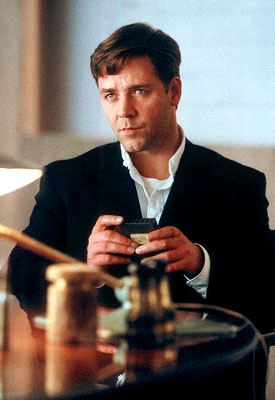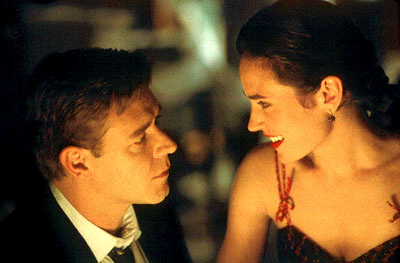

In the Prisoner's Dilemma, two (guilty) prisoners are interviewed separately. They can either confess or profess their innocence. The best outcome happens if neither confess, then they will get off scot free. If one confesses and the other does not, the latter will suffer more. But can one person not confess and expect the other not to? The solution is for each person to play the 'game' such that his/her own interests are the most important. So in this case, it is in each prisoner's best interest to confess. The Prisoner's Dilemma is a classic example of Game Theory, a branch of economics possible because of the work of John Forbes Nash, Jr. Nash won the Nobel Prize in 1994 for his work in economics. The award is all the more amazing considering Nash suffered from paranoid schizophrenia. A Beautiful Mind is an adaptation of Sylvia Nasar's biography of Nash, which felt like both biography and textbook. The book (which is truer to life) is extremely different from the film (the production notes claim was 'inspired by events in the life' of Nash), which dramatizes events to make them more palatable for movie viewers. Comparing the two, the book is far superior. However, since most people have never heard of Nash, the film will be their only exposure. Ignoring the book, the film is a moving portrayal of a man trying to deal with his illness.
A Beautiful Mind begins with Nash (Russell Crowe, Proof of Life, Gladiator) entering Princeton for graduate school in 1947. While other students furiously publish papers and attend class, Nash withdraws and seeks his own original idea. This idea will bring him the recognition he feels he deserves, as well as acceptance among his peers. In probably the most annoying element of the film, Nash finally develops his theories after observing his friends try to pick up women in a bar. The movie then follows Nash to MIT, where he meets and marries student Alicia Larde (Jennifer Connelly, Requiem for a Dream, Waking the Dead). There, he also meets William Parcher (Ed Harris, Enemy at the Gates, Pollock), who enlists Nash to break codes for the Department of Defense. The strain of the work is too much for Nash, who cracks under the pressure. The only constants in his life are Alicia, Parcher, Nash's college roommate Charles (Paul Bettany, A Knight's Tale, Mood Swingers), and former rival classmate Hansen (Josh Lucas, Session 9, The Deep End).
The primary reason the film differs so much from the book is to allow writer Akiva Goldsman (Practical Magic, Lost in Space) to portray Nash's schizophrenia in such a way that the audience can relate to it. It has been done before, but Goldsman and director Ron Howard (How the Grinch Stole Christmas, EdTV) do not tell the audience they are doing it. Goldsman and Howard combined their talents to craft the story. Goldsman's parents founded a group home for emotionally disturbed children, so he was able to bring in personal experience. This shows in the handling of Nash's schizophrenia. It is a realistic, delicate portrayal that is heartbreaking. It's hard to believe this is the same man responsible for Batman and Robin. Howard's talent lies in creating films that appeal widely. He adds accessibility and emotion to a possibly dense story.
As good as Goldsman's script and Howard's direction are, the real reason to see A Beautiful Mind is because of the acting. Harris is his normal, steely persona. Crowe gives a good performance, which, knowing the Academy, should net him another nod for Best Actor. Again he sinks into his role, nearly unrecognizable at times. His Nash always looks edgy and nervous, never looking people directly in the eye for long. Crowe is a mass of nervous tics and awkward moments. But as good as Crowe is, Connelly towers over everybody else in the film. Alicia is the emotional anchor of the movie. She opens Nash to emotion, and stays by his side through everything that happens. It is her will, determination, and love that helps Nash survive. Nash's condition affects Alicia immensely, and Connelly convincingly portrays a woman trying to hide this devastation. This is a role of tremendous depth for Connelly, who so far has refused to play by Hollywood's rules. She picks and chooses her roles, seemingly choosing scripts and difficulty over ones that are more conventional. Connelly is slowing becoming a great actor, right under everybody's radar. Since A Beautiful Mind does have a decently high profile, maybe Connelly will finally get the recognition she deserves.